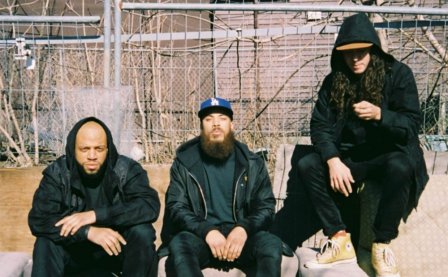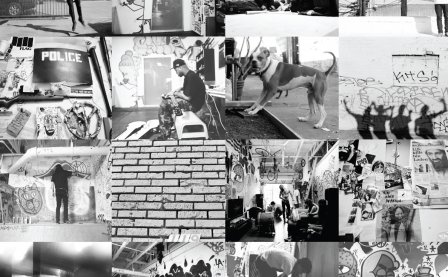I took a look back at my review of Trash Talk’s 119 to see exactly how much of what I said about that album could be directly applied to No Peace. The answer, I think, is “pretty much all of it.” I still feel the same general sense of goodwill toward the band, a warm appreciation that has less to do with what they produce as what they represent: the fact that there’s still a place at the cool-kids’ table for grimy guitar music delivered with all the subtlety of a broken bottle to the face. I’d still jump at the opportunity to see them ply their trade in person, and I still couldn’t care less to listen to one of their records.
Trash Talk are a more-than-competent hardcore act, but it’s clear that their major differentiating attribute is their association with the Odd Future collective, currently transitioning from being hip-hop’s enfant terrible into an institution in their own right. 119 featured a collab with Tyler, The Creator and Hodgy Beats, and No Peace continues this flirtation with rap by pairing the group with producer Alchemist, known for dropping beats for the likes of Mobb Deep and Eminem. Al’s most visible contributions to the record are the minute-and-change intro and outro, “Amnesiac” and “Reprieve,” which, while offering a touch of tonal variety to the record, feel oddly disconnected from the blisteringly aggressive tracks that they bookend.
The most significant development on No Peace is probably the increasing prominence of bass player Spencer Pollard. While his commanding bark has long played the foil to Lee Spielman’s gravelly lead vocals, he’s a far more constant presence on this batch of songs. He positively owns the chorus on “Cloudkicker” and slathers an extra layer of brutality to the hammering “Locked in Skin.” It’s a welcome change, although not quite a game-changing one.
And I’m conscious, as I drop the phrase “game changing,” of falling into that annoying critical trap of beating up on an album for both what it’s not and what it’s not even trying to be. Hardcore, like black metal, is less about innovation and more about tradition, and as such, it’s beside the point to condemn a hardcore album for failing to try anything new (and, of course, we all recognize that the concept of “newness” itself is a bit of an albatross). Trash Talk fits well into the tradition of hardcore, but it doesn’t change the fact that some crucial piece is missing to justify the band’s elevated position. The album’s press release assures us that No Peace “captures the squalor and unpleasant scenes” of the band’s L.A. neighborhood, but the worldview Trash Talk puts forward continues to feel generic, as though it has passed through too many links in the human centipede of hardcore punk to contain any vital nutrients by the time it makes its way to us.
More about: Trash Talk




